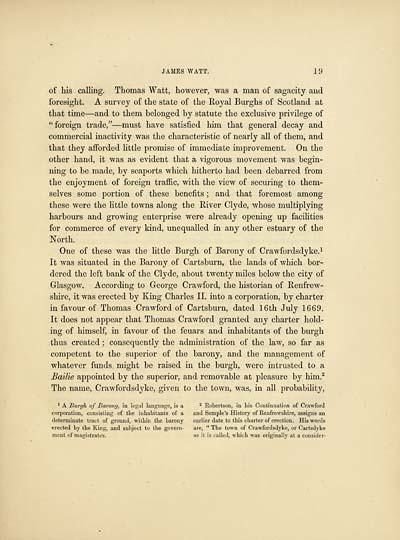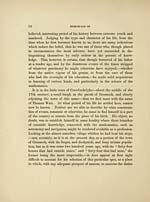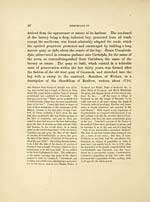Memorials of the lineage, early life, education and development of the genius of James Watt
(37) Page 19
Download files
Complete book:
Individual page:
Thumbnail gallery: Grid view | List view

JAMES WATT. 19
of his calling. Thomas Watt, however, was a man of sagacity and
foresight. A survey of the state of the Royal Burghs of Scotland at
that time — and to them belonged by statute the exclusive privilege of
"foreign trade," — must have satisfied him that general decay and
commercial inactivity was the characteristic of nearly all of them, and
that they afforded httle promise of immediate improvement. On the
other hand, it was as evident that a vigorous movement was begin-
ning to be made, by seaports which hitherto had been debarred from
the enjoyment of foreign traffic, with the view of securing to them-
selves some portion of these benefits ; and that foremost among
these were the little towns along the River Clyde, whose multiplying
harbours and growing enterprise were already opening up facilities
for commerce of every kind, unequalled in any other estuary of the
North.
One of these was the little Burgh of Barony of Crawfordsdyke. 1
It was situated in the Barony of Cartsburn, the lands of which bor-
dered the left bank of the Clyde, about twenty miles below the city of
Glasgow. According to George Crawford, the historian of Renfrew-
shire, it was erected by King Charles II. into a corporation, by charter
in favour of Thomas Crawford of Cartsburn, dated 16th July 1669.
It does not appear that Thomas Crawford granted any charter hold-
ing of himself, in favour of the feuars and inhabitants of the burgh
thus created ; consequently the administration of the law, so far as
competent to the superior of the barony, and the management of
whatever funds might be raised in the burgh, were intrusted to a
Bailie appointed by the superior, and removable at pleasure by him. 2
The name, Crawfordsdyke, given to the town, was, in all probability,
1 A Burgh of Barony, in legal language, is a 2 Robertson, in his Continuation of Crawford
corporation, consisting of the iuhabitants of a and Semple's History of Renfrewshire, assigns an
determinate tract of ground, within the barony earlier date to this charter of erection. His words
erected by the King, and subject to the govern- are, " The town of Crawfordsdyke, or Cartsdyke
ment of magistrates. as it is called, which was originally at a consider-
of his calling. Thomas Watt, however, was a man of sagacity and
foresight. A survey of the state of the Royal Burghs of Scotland at
that time — and to them belonged by statute the exclusive privilege of
"foreign trade," — must have satisfied him that general decay and
commercial inactivity was the characteristic of nearly all of them, and
that they afforded httle promise of immediate improvement. On the
other hand, it was as evident that a vigorous movement was begin-
ning to be made, by seaports which hitherto had been debarred from
the enjoyment of foreign traffic, with the view of securing to them-
selves some portion of these benefits ; and that foremost among
these were the little towns along the River Clyde, whose multiplying
harbours and growing enterprise were already opening up facilities
for commerce of every kind, unequalled in any other estuary of the
North.
One of these was the little Burgh of Barony of Crawfordsdyke. 1
It was situated in the Barony of Cartsburn, the lands of which bor-
dered the left bank of the Clyde, about twenty miles below the city of
Glasgow. According to George Crawford, the historian of Renfrew-
shire, it was erected by King Charles II. into a corporation, by charter
in favour of Thomas Crawford of Cartsburn, dated 16th July 1669.
It does not appear that Thomas Crawford granted any charter hold-
ing of himself, in favour of the feuars and inhabitants of the burgh
thus created ; consequently the administration of the law, so far as
competent to the superior of the barony, and the management of
whatever funds might be raised in the burgh, were intrusted to a
Bailie appointed by the superior, and removable at pleasure by him. 2
The name, Crawfordsdyke, given to the town, was, in all probability,
1 A Burgh of Barony, in legal language, is a 2 Robertson, in his Continuation of Crawford
corporation, consisting of the iuhabitants of a and Semple's History of Renfrewshire, assigns an
determinate tract of ground, within the barony earlier date to this charter of erection. His words
erected by the King, and subject to the govern- are, " The town of Crawfordsdyke, or Cartsdyke
ment of magistrates. as it is called, which was originally at a consider-
Set display mode to:
![]() Universal Viewer |
Universal Viewer | ![]() Mirador |
Large image | Transcription
Mirador |
Large image | Transcription
Images and transcriptions on this page, including medium image downloads, may be used under the Creative Commons Attribution 4.0 International Licence unless otherwise stated. ![]()
| Histories of Scottish families > Memorials of the lineage, early life, education and development of the genius of James Watt > (37) Page 19 |
|---|
| Permanent URL | https://digital.nls.uk/95169898 |
|---|
| Description | A selection of almost 400 printed items relating to the history of Scottish families, mostly dating from the 19th and early 20th centuries. Includes memoirs, genealogies and clan histories, with a few produced by emigrant families. The earliest family history goes back to AD 916. |
|---|

